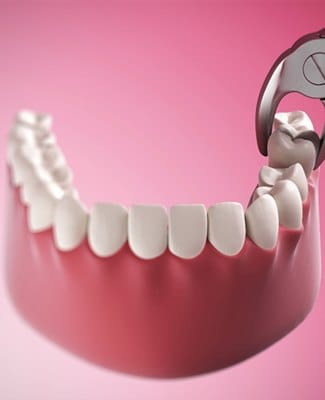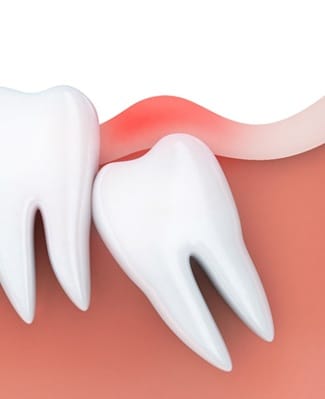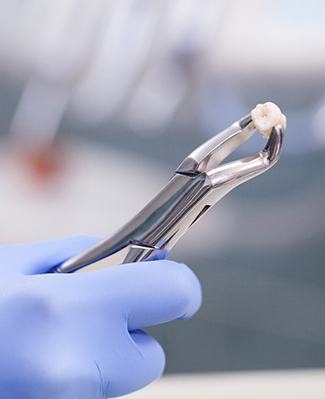Tooth Extractions - Federal Way, WA
Experience Your Can Trust for Extractions
No one wants to be told that they need a tooth extraction in Federal Way. However, some situations require it because the tooth is too badly damaged or because it’s causing problems with neighboring teeth. In the event Dr. Beaty determines that your tooth is at risk of causing more issues with your oral health or is simply beyond repair, only then will he resort to extraction. Before your treatment, you’ll receive a step-by-step explanation of what to expect.
Why Choose Drew Beaty, DDS Family and Cosmetic Dentistry for Tooth Extractions?
- Sedation dentistry for more comfortable care.
- Patient-focused care from an experienced dentist.
- Calming office providing multiple tooth replacement options.
Why Does My Tooth Need to Be Extracted?

Removal of a problem tooth is always the last treatment resort, and Dr. Beaty will do his best to rescue your natural tooth. However, when saving the tooth is just not possible, extraction is necessary. Whether you are experiencing an impacted wisdom tooth, an infected molar, a crowded tooth, or any other case that requires removal of the tooth, we are prepared. Our office is equipped with the technology, experienced staff, and patient comforts to make extractions as smooth as possible.
Different Types of Tooth Extractions

Your teeth are designed to last for a lifetime, but there are certain instances when it is in your best interest to have one removed. Depending on your treatment plan, you may need a simple or surgical extraction. A simple extraction is performed when a tooth is visible above the gum line. A surgical extraction is needed when a tooth is not fully visible above the gum tissue. There are various types of tooth extractions Dr. Beaty performs, including:
Wisdom Tooth Extraction
Wisdom teeth often need to be removed because there is not enough room in the mouth to accommodate a third set of molars. We recommend you have them removed in they are fully or partially impacted, cause overcrowding, or other oral health issues, like infection or tooth decay.
Learn More About Wisdom Tooth Extraction
Multiple Tooth Extractions
Genetics, injury, or significant decay can require some patients to need multiple teeth removed at once. Besides the process to extract the teeth, Dr. Beaty will also discuss tooth replacement options, such as dental implants.
Extraction Site Preservation
Dental implants are the best solution to treat tooth loss, but decreased bone density can compromise your jaw’s ability to support the posts. Dr. Beaty can fortify the bone with a grafting material to keep the jaw to accommodate dental implants after your extraction sites heal.
Post-Operative Care

Dr. Beaty will carefully explain your go-home instructions and how to care for the extraction site while you heal. It is best too:
- Bite on a gauze pad to reduce bleeding and to allow a clot to form.
- Limit your activity for a couple of days.
- Stick to soft foods and avoid chewing on the side of your mouth near the extraction site.
- Use over-the-counter pain relievers.
- Apply ice to reduce swelling.
- Do not drink from a straw.
- Maintain your oral hygiene.
- Do not smoke or use tobacco.
Are you in need of a tooth extraction? Dr. Beaty can help. Contact our office today to schedule your consultation.
Understanding the Cost of Tooth Extractions

A tooth extraction is never your dentist’s first choice, but sometimes it’s a necessary step to preserve the health of the rest of your smile. If you’ve been told that you’re in need of one or more extractions, it is understandable to be concerned about the cost. Here are some things that you should know about the price of having a tooth extraction.
Factors That Can Affect Tooth Extraction Cost

It can be difficult to know the cost of an extraction until we have thoroughly examined your smile to identify the root of the problem. During your appointment, we will take a look to find out exactly what’s necessary for you. Here are some of the main factors that determine the cost:
- Location: The type and location of your tooth will influence the cost of your procedure.
- Number of Teeth: The more teeth you have extracted, the more the treatment will cost.
- Complexity: Some cases are more complex than others, and this will influence the price. For instance, an impacted tooth extraction will most likely cost more than a simple extraction.
Does Dental Insurance Cover Tooth Extractions?

It’s common for dental insurance to cover approximately 50% of the cost of tooth extractions after your deductible has been met. However, there are sometimes limits in place to only cover up to a certain number of teeth or a waiting period before your coverage will kick in. Since every plan is different, it’s a good idea to check with your insurance provider beforehand. We are also happy to help you out with this process.
Other Options for Making Tooth Extractions Affordable

If you don’t have dental insurance, this doesn’t mean that you’re out of luck. With our Dental Savings Plan, you can save 15% on dental services completed at our practice. We also work with CareCredit – a third-party financing company that can split the cost of your treatment into manageable monthly installments with little to no interest. Talk to one of our friendly team members to learn more about your options.
To find out exactly how much you can expect your treatment to cost, schedule an appointment with us. We’re eager to help you get some relief!
Tooth Extraction FAQs

Dr. Beaty takes pride in his honest and down-to-Earth approach to dentistry, which is why he won’t suggest procedures such as extraction except when they’re truly needed. He’s here to answer all of your questions so that you understand exactly why the extraction needs to happen and what you can expect during the process. These are just some of the inquiries that patients have had in the past; don’t hesitate to contact us with additional concerns!
How Do I Know If I Need an Extraction?
Extraction is a common solution for teeth that are badly broken or in pain, but you won’t be able to tell whether the procedure is needed on your own. First, you should call our office so that we can check the tooth. If possible, we might place a crown or perform root canal therapy instead; these treatments will keep your natural smile fully intact and stop the damage before it grows worse. Sometimes, though, a tooth simply cannot be kept without compromising your oral health. The pros and cons of all your available options will be clearly explained before we ask you to make a decision.
What Do I Do to Get Ready for Extraction?
After all the requisite testing is complete, we can schedule a date for the extraction. Before then, we may ask you to follow some specific instructions depending on your situation. For example, if you have a condition that has weakened your immune system, you may have a higher-than-average chance of suffering from an infection after surgery. In such cases, antibiotics might be required. Also, if you get sick shortly before the planned date of the procedure, we’ll need to make a few changes to the treatment plan. We may also need you to follow specific steps depending on the type of sedation used during the procedure.
How Much Pain is Normal Afterwards?
The extraction itself shouldn’t be too uncomfortable since your mouth will be numbed, but some pain and swelling are normal during the first 24 hours after the anesthetic has worn off. We generally recommend keeping painkillers and an ice pack on hand while your mouth heals; this should make any discomfort you experience completely manageable. If the pain lasts longer than it should, or if you notice symptoms such as fever, chills, or nausea, get in touch with us right away so that we can figure out the necessary next step.
What About the Gap That’s Left Afterwards?
You have the option of leaving the space where the tooth used to be empty, but that will cause the rest of the smile to drift and become misaligned. Severe alignment issues could make it harder to chew and might even lead to more tooth loss later on. You will have a few different options for replacing the tooth, including dental implants, bridges, and partial dentures. Each of these restorations will have advantages and disadvantages to consider based on your overall health as well as your budget.
